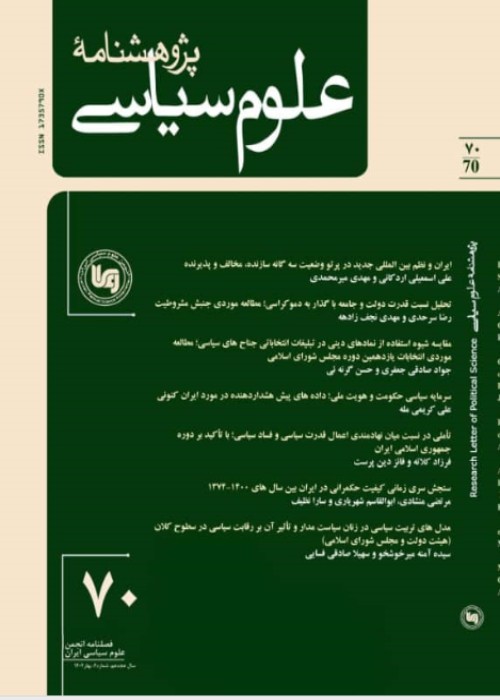THE COGNITIVE AND METHODOLOGICAL FRAMEWORKS OF ISLAMIC INTELLECTUALS ON WOMEN’S SOCIO-POLITICAL RIGHTS (Case study: Mohsen Kadivar and Mohammad Mojtahed Shabestari)
Author(s):
Article Type:
Research/Original Article (دارای رتبه معتبر)
Abstract:
More than thousand years, the traditional understanding of Islam, based on its ancient and huge religious heritage, has interpreted the appearance, identity and rights of women in Islamic communities around the concepts of inherent inequality between men and women with the emphasis on the natural role of women and their pessimism about women’s presence in the social and political arenas. Rapid changes in the life conditions of the Islamic communities have created new needs and demands that this cognitive and methodological framework and the mechanisms used in this reading of Islam do not address these needs and could not open up a section of the growing problems and needs of women corresponding their rights with the new human rights standards. Following this failure and the identity crisis that Islamic societies have encountered as a result of confrontation with western modernity, a group of Muslims who believe in Islamic principles and influenced by the positive aspects of western modernization, began to re-interpret the principles and rules of the Shari'a, offering a new reading of Islam in the form of reforming and resuscitation of religious thought. This article seeks to recognize how the appearance, identity and legal stand of women is reflected in the rational- epistemological foundations of Islamic intellectualism, and what the epistemological frameworks of this attitude are on the women’s political and social rights and what differences it has with its traditional rival. Our assumption is that Islamic intellectualism approach taking advantage of the new epistemological achievements has a humanistic view on woman trying to depict the appearance and identity of woman according to the morality, justice, conventionality, interpretation of religious texts and its shift according to the time requirements. This issue has potentially the required ability to produce fundamental changes in the women’s rights and in accordance with the new standards of human rights. Our emphasis in this article is based on the views of two most influential contemporary Iranian Muslim intellectuals, Mohammad Mujtahid Shabestari and Mohsen Kadivar. This study is a documentary research and data collection is done in a way of scanning documents, books, essays and websites. To analyze the data, the researchers have used a combination of literal and grounded hermeneutic method.
Keywords:
Language:
Persian
Published:
Journal of Political science Association, Volume:13 Issue: 4, 2018
Pages:
7 to 38
magiran.com/p1967502
دانلود و مطالعه متن این مقاله با یکی از روشهای زیر امکان پذیر است:
اشتراک شخصی
با عضویت و پرداخت آنلاین حق اشتراک یکساله به مبلغ 1,390,000ريال میتوانید 70 عنوان مطلب دانلود کنید!
اشتراک سازمانی
به کتابخانه دانشگاه یا محل کار خود پیشنهاد کنید تا اشتراک سازمانی این پایگاه را برای دسترسی نامحدود همه کاربران به متن مطالب تهیه نمایند!
توجه!
- حق عضویت دریافتی صرف حمایت از نشریات عضو و نگهداری، تکمیل و توسعه مگیران میشود.
- پرداخت حق اشتراک و دانلود مقالات اجازه بازنشر آن در سایر رسانههای چاپی و دیجیتال را به کاربر نمیدهد.
In order to view content subscription is required
Personal subscription
Subscribe magiran.com for 70 € euros via PayPal and download 70 articles during a year.
Organization subscription
Please contact us to subscribe your university or library for unlimited access!


